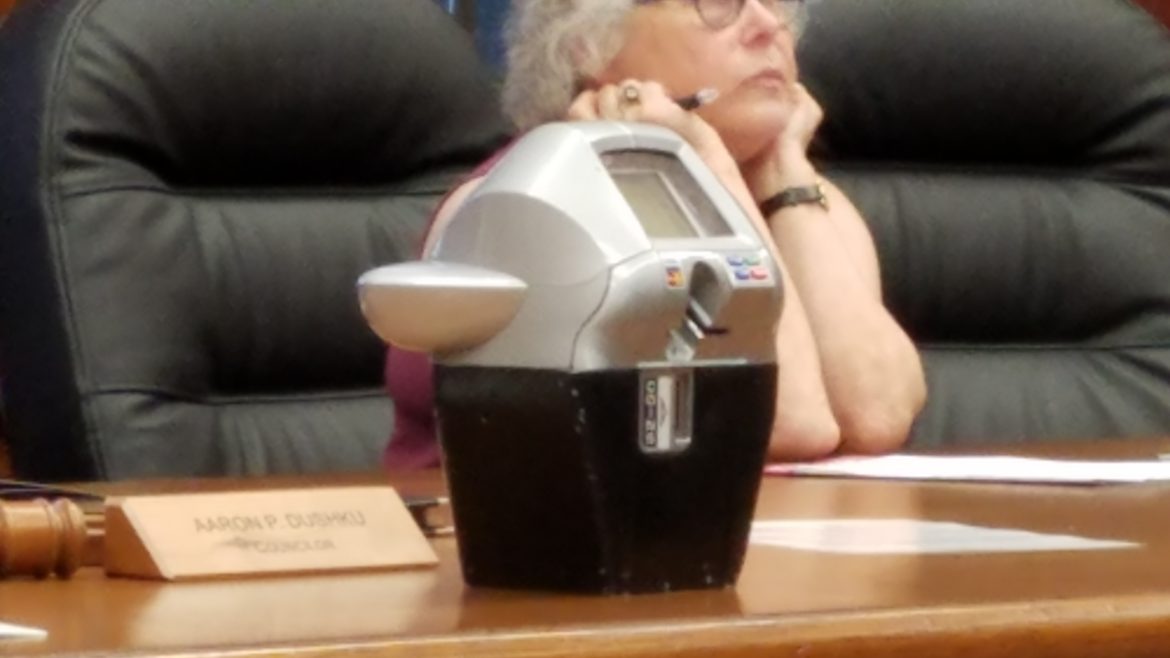
Charlie Breitrose
The Town Council is mulling over whether to buy smart parking meters, like this one, which takes multiple types of payments and provides data, but also have a larger price tag.
As the town looks at replacing parking meters, the Town Council’s Public Works Committee will consider installing smart parking meters that take multiple forms of payment and could even let them know when spaces are free, coins are jammed and allow fees to be adjusted on the fly.
More and more communities in the Boston area use these high tech meters, and Mark Berling of IPS Group said the meters can slip right on top of the current meters.
The new meter system can be a big money maker, too.
“A well run smart parking system can be the third largest revenue generator of funds municipalities,” Berling said. “This includes revenue from meters and the tickets.”
The meters would accept coins, credit cards, special parking cards which can be recharged and some communities allow payment using smart phone apps, Berling said.
Credit card payments are very popular, with it making up 30-75 percent of meter payments in IPS’s 160 client towns around the country, Berling said. The smart phone payments make up less than 10 percent of transactions, but are popular with younger people. Dennis Sheehan, the Public Works Director of Administration and Finance, noted that towns use a variety of different parking apps, which can be confusing.
There are other options, including a kiosk pay station where people put in their spot number and pay at the kiosk. Councilor Vincent Piccirilli said it might make sense to have a kiosk in the municipal lot behind CVS and smart meters for street parking.
The meters have many other features, Berling said, including letting the town know when the coins need to be emptied, when a meter is broken and even when a spot is filled.
Town officials can log onto a dashboard that shows that information, and other details such as when a payment was made and when the person left the spot.
“So when I call to complain about a ticket they can tell if I was telling the truth?” asked Councilor Susan Falkoff. Berling said, “Yes.”
Councilor Aaron Dushku said he is interested in the data that the meter system could provide. That way, the town can manage parking demand by increasing and decreasing the price of parking in different areas.
When a car leaves a spot, the meter will zero out, so there is no time remaining. This helps increase the amount of meter payments the town receives. Berling said accepting credit cards also tends to boost revenues, too.
“Most people max it out, pay the $2 (or maximum) and go on their way,” Berling said.
With the increased range of functions comes an increase in price. Installing nearly 400 meters would cost $55,000, said Town Treasurer Joseph Divito. The cost of using all the technology available is $12 per meter, which adds up to another $55,000, Divito said.
The town also loses some of the parking revenue when people use credit cards because there is a fee of 22-25 cents per transaction added by the credit companies, Divito said. It could also be passed on to users as a convenience fee.
Dushku acknowledged that the price of parking will have to rise to pay for the smart parking meters, but the town will get more out of them.
“We are not doing it for the money,” Dushku said. “We will set it up so we have data and can set new rates.”
Berling said there are ways of offering discounts, such as parking tokens sold at a lower rate, a smart parking card that can be recharged and people won’t be charged credit card fees. Falkoff noted that the town offers parking passes for seniors to parking in town lots, and said something would have to be figured to accommodate them.
The subcommittee voted to have the Treasurer and the Department of Public Works look further into smart meters and come back with a recommendation.
Falkoff noted that the town offers parking passes for seniors to parking in town lots, and said something would have to be figured to accommodate them.
Hopefully before the new system is in place and free of glitches.